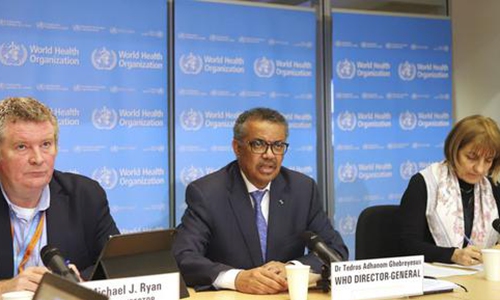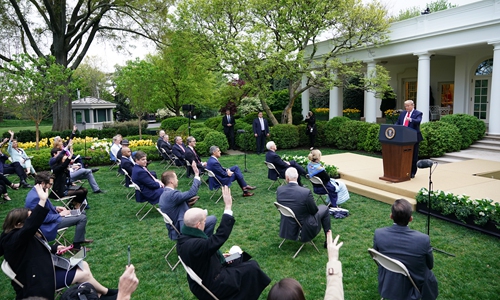Washington defunding WHO a ‘move against humanity’ amid global pandemic
By Chen Qingqing, Li Aixin and Ni Hao Source:Global Times Published: 2020/4/15 17:43:40 Last Updated: 2020/4/15 22:43:40
US sets horrible example for global community, weaponizing populist sentiment

Dr. Tedros Adhanom Ghebreyesus (C), World Health Organization (WHO) Director-General, addresses a press conference, on which WHO said that China's latest epidemiological paper on COVID-19 is important in enabling it to provide advice to other countries, in Geneva, Switzerland, Feb. 17, 2020. (Xinhua/Chen Junxia)
Halting funding to an organization that plays an irreplaceable and vital role in helping countries get prepared for and respond to the pandemic is a "move of genocide" against humanity, especially when most virus-stricken places are still suffering, and shifting the blame to the World Health Organization (WHO) won't help cover up US President Donald Trump's catastrophic mishandling of the coronavirus crisis, leading the US into a very dangerous situation, predominant experts and observers said.Trump announced on Tuesday the US would halt funding for the WHO over its coronavirus response, accusing the organization of severely mismanaging and covering up the outbreak and claiming that the WHO made a dangerous decision in opposing travel restrictions from China and other nations.
This decision to unilaterally slash funding to the organization, which is widely recognized for its essential role in providing global governance over health and disease crises, came after the Trump administration was slammed for mishandling the pandemic, which has so far caused over 600,000 confirmed cases in the US, with reportedly over 2,300 deaths on Tuesday - the highest daily death toll.
Trump under criticism
Many foreign and Chinese experts, from medical professionals and key opinion influencers to geopolitical observers, voiced strong opposition to the decision, particularly when the majority of countries and regions across the world have been fighting the pandemic with the help of the WHO.
"Trump's decision to suspend US payments to the WHO in the midst of the present pandemic is outrageous and grossly irresponsible," said Martin Jacques, who was a senior fellow at the Department of Politics and International Studies at Cambridge University, noting that the move prioritizes his own electoral interests over the needs of Americans and people around the world.
The novel coronavirus pneumonia (COVID-19) pandemic cannot be solved on a nation-by-nation basis and instead requires concerted global action to bring all nations together, the expert noted. "It is a classic example of the fundamental importance of global cooperation," Jacques told the Global Times on Wednesday.
Tedros Adhanom Ghebreyesus, Director-General of the WHO, said in a press conference on Wednesday that the organization regrets the decision of the US government to order a halt in funding to the WHO, emphasizing that with support from the people and government of the US, the WHO works to improve the health of many of the world's poorest and most vulnerable people.
China expressed serious concern on Wednesday about the US' move. The US halting WHO funding will undermine the WHO's ability and global cooperation in combating COVID-19. All countries, including the US will be affected, Zhao Lijian, spokesperson of the Chinese Foreign Ministry, said in a press conference.
Chinese President Xi Jinping wrote in his latest article to be published on Party-affiliated Qiushi journal that solidarity and cooperation are the most powerful weapon against the COVID-19 pandemic, stressing that China is willing to work with the WHO and international community to safeguard regional and global public health safety.

Sitting on the front row US Vice President Mike Pence and response coordinator for the White House Coronavirus Task Force Deborah Birx listen to US President Donald Trump speak during a daily briefing on COVID-19 in the Rose Garden at the White House on Tuesday in Washington DC. Photo: AFP
ScapegoatingTrump has been sharpening his criticism of the WHO in recent days, claiming that the specialized UN agency focused too much on China and issued inappropriate guidelines. However, since the beginning of the outbreak, the WHO has been issuing warnings and sharing experiences with countries and regions across the world.
The WHO warned countries and regions across the world in mid-January and declared the novel coronavirus outbreak a public health emergency of international concern on January 30.
Based on that, the US government made the decision to restrict entry from China, though the WHO advised against the application of travel restrictions. While Trump paid little attention to WHO's advice, he also reportedly ignored a warning from a senior government advisor in late January, insisting that he was "not concerned" about the public health crisis in an interview on March 7.
Withholding funding for the WHO once again reflected Trump's populist stance - hoping the world will make contributions to the US while the US itself makes no contribution to the world, Li Haidong, a professor at the Institute of International Relations of the China Foreign Affairs University, told the Global Times on Wednesday.
"The US, which has shown no interest in global collaboration since Trump assumed office, is encouraging countries to stew in their own juices," he said.
"It is totally an attempt to divert attention from his failure to prepare the US for the coronavirus despite a two-month warning. Tens of thousands of Americans have died as a result of such failures to prepare," John Ross, a senior fellow at the Chongyang Institute for Financial Studies at Renmin University of China, told the Global Times on Wednesday.
The US response to the coronavirus is still inadequate with no real lockdowns in large parts of the country and cutting off funding to the WHO is cynical politics which therefore threatens not only the international community but also Americans, Ross noted.
Some veteran medical experts said that this diversion of public attention from the US' own failure in dealing with COVID-19 to an international health organization is truly unethical and disgraceful.
The US government thought the country would be safe by banning travelers from China but completely ignored the warnings of experts, did nothing to supervise and prevent the spread of the virus in communities and did nothing to prepare for the epidemic.
Richard Horton, editor-in-chief of well-known medical journal The Lancet, tweeted that the decision to defund the WHO "is simply this - a crime against humanity. Every scientist, every health worker, every citizen must resist and rebel against this appalling betrayal of global solidarity."
Zeng Guang, chief epidemiologist at the Chinese Center for Disease Control and Prevention, told the Global Times that now is the right time for the WHO to play its role as the global community tries to fight the COVID-19 pandemic, and the US attempt to pass the buck to the organization is "unethical and will only make it more isolated in the world."
The US is the biggest financial contributor to the WHO for 2020-2021, accounting for 22 percent of the total assessed contributions from the organization's member states, according to WHO data. Trump also noted on Tuesday that American taxpayers provided between $400 million and $500 million per year to it while China contributes about $40 million per year or less.
Brett McGurk, a former senior national security adviser to three American presidents, said that ceasing contributions to the WHO in the middle of a raging global pandemic is "an embarrassment - a sign of weakness, panic, and scapegoating."
Thirty percent of countries around the world have no COVID-19 response programs and depend on the WHO for assistance, McGurk said in a tweet. The US is not about to fill this gap, and more people will die and the virus will spread in order to distract people from Trump's negligence.
The US showed little interest in cooperation amid the pandemic, which was soon revealed in its disputes with its close allies after the outbreak.
For instance, in early April, the US blocked exports of masks from 3M, one of the biggest US mask manufacturers, to other countries. The move soon met with condemnation from Canada.
Washington was also accused of "piracy" by Berlin for reportedly diverting a shipment of masks intended for Germany.
"The cut to the WHO is characteristic of Trump's unilateralist attacks on multilateral organizations which have so far included UNESCO and the UNHCR," Tom Fowdy, a British political and international relations analyst and graduate of Durham and Oxford universities, told the Global Times on Wednesday.
In doing so, the US president aims to both deflect his own failures regarding the pandemic and weaponize populist sentiment to save US taxpayers money through pushing American aid cuts, he noted.
Jacques said the halt of funding to the WHO is a graphic example of how Trump's America First - or, more accurately in this context, Trump First - policy is backward-looking and contrary to the imperatives and needs of a globalized world.
Influential American billionaire Bill Gates said in a tweet that it is a dangerous move, as the WHO is slowing the spread of the virus, and if that work is stopped, no other organization can replace it.
"The world needs the WHO now more than ever," he said.
Impact of the withdrawal
The US suspension of funds to the WHO won't impact the international health organization in its sharing of information with the world, but may result in a shortage of funds for staff salaries and some projects, Zeng from China's CDC said.
While more countries recognized the role of the WHO, which is widely seen as indispensable in boosting solidarity and allocating resources to protect citizens and save lives, countries like China and the UK made much more donations to the organization since the outbreak, in a contrary to the US unilateral stance.
Zhang Dan, vice-president and director-general of the United Nations Association of China, told the Global Times on Wednesday that if the US freezes its funding to the WHO, the organization is bound to be affected.
Zhang noted that most of the WHO budget is used for expenditures in projects worldwide, including the procurement of medical equipment, payments for local services and costs for program operations. A shortage of funds will lead to difficulties, causing the slowing down or even scaling down of such projects, she said.
"But the US suspending funding to the WHO will not play a decisive role in that," Zhang added.
Voluntary contributions account for the majority of the WHO's funding and emergency fundraising is a crucial part of it. For instance, organizations like the UN Refugee Agency, UN Children's Fund, UN Food and Agriculture Organization can all appeal for urgent funds amid a major public health emergency of international concern.
The money will come from governments and civil organizations as well. The WHO can do the same. The Trump administration has no right to ask its citizens not to donate to the organization, Zhang explained.
"That being said, not all funding from the US will be halted," Zhang said, noting quite a few non-governmental organizations are enthusiastic in making donations to the WHO.
With the Trump administration continuing to withdraw from international organizations and now defunding the WHO, voices calling for China to step into the power vacuum and lead the world have again emerged on the internet.
"This is an extreme way of portraying China's efforts," Li said, noting that China is doing everything within its ability to coordinate global efforts in the fight against the coronavirus, as well as contributing its resources and experience to other countries, but China is not dominating, or manipulating others' fights in the battlefield.
China and the WHO are fulfilling their duties by trying hard to pool what resources they can mobilize as collaboration and solidarity are badly needed to fight the global pandemic, according to experts.
Some American netizens slammed Trump's decision to defund the WHO, particularly during a pandemic, claiming it is tantamount to genocide.
"Instead of spending money on wars and arms for dictators, we should invest in the WHO and ensure our national security by protecting the health of all people," a netizen said.
RELATED ARTICLES:
Posted in: DIPLOMACY